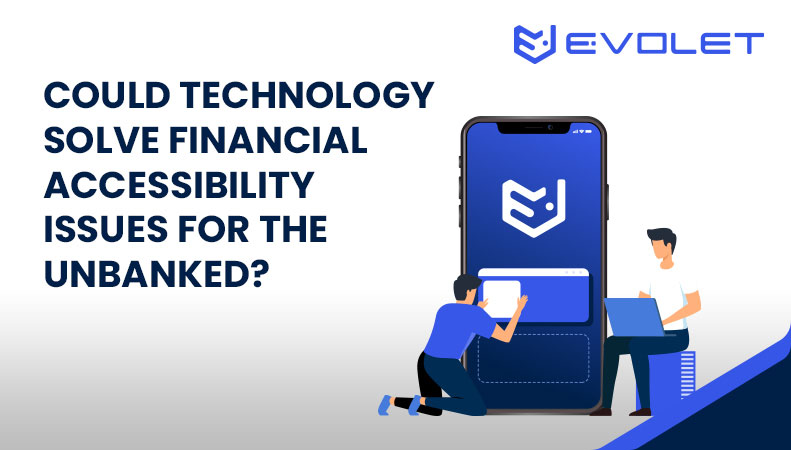
COULD TECHNOLOGY SOLVE FINANCIAL ACCESSIBILITY ISSUES FOR THE UNBANKED?
15th February 2021
Did you know that more than 1.7 billion people are unbanked globally? This implies that they have no access to financial services, including a bank account let alone an e-wallet. The bulk of the world population lives in Africa, South Asia, Southeast Asia and China. Most of them live in areas that do not have formal financial institutions and are a long distance away from banks.
To make financial services available, affordable and sustainable, digital technology offers t`he most promise. Mobile phones alone have made sending and receiving money, making payments, and even having access to credit simpler and cheaper for those who do not have a bank account. What's interesting is how technology has spread exponentially, even entering the bottom of the pyramid, through revenue groups across the world.
Why do banks need to reach the unbanked?
With payment systems moving to the digital realm, it is more necessary than ever to meet the unbanked. A decade ago, for their jobs, people were usually paid in cash. But with a global move to digitization, workers who have previously been compensated in cash need to find ways to obtain compensation for their jobs. According to a survey, to start collecting their job payments, 9% of the global population opened a bank account.
Since most are searching for digital payment solutions and moving away from a cash-based economy, conventional financial institutions need to take advantage of it and make it easy for the unbanked or underbanked to access their services.
Financial inclusion
Financial inclusion ensures that individuals and companies have access, responsibly and sustainably, to valuable and accessible financial products and services that meet their needs: purchases, transfers, deposits, credit and insurance. The ability to open a transaction account is the first step towards greater financial inclusion since a transaction account enables individuals to store money and send and receive payments.
Technology can connect customers, no matter where they live, to a wide variety of financial services, a crucial step in reducing poverty and improving the quality of life of people. People can set away money for household needs with the aid of Fintech, make payments easily and on time, get loans to start a company, and save for emergencies. It also saves them time commuting to distant bank branches to use basic financial services, which is extremely important for individuals who can not afford to leave their job or company unattended.
What can Digital Finance do?
Digital technology is moving at an incredible speed and is altering the financial infrastructure. Furthermore, exponential growth in computing capacity and its recent by-products, such as big data, artificial intelligence, and cloud computing, have opened up large possibilities for growing financial inclusion by using digital technology.
To provide affordable services, the Alibaba Group is also using digital technologies to improve productivity and lower costs. Every day, artificial intelligence manages millions of online shoppers' requests and queries, while cloud computing can process more than 100,000 transactions per second.
Technology to increase loan access
A major obstacle in bridging the inequality gap is that it is very difficult for people on low incomes without bank accounts to borrow money. For those without a bank account or credit card, loan applications and approvals include paperwork, background checks and credit history, which is a near impossibility.
Fintech pioneers are actively looking at workaround solutions to create new technology to determine the credit background and financial discipline of an individual through big data, with these groundbreaking solutions already being implemented in Africa and Southeast Asia. For example, there are banks and financial institutions in Malaysia that have introduced their very own e-wallet systems to help mainstream digital payments.
Most low-income individuals often lack traditional credit records in Southeast Asia, making it difficult to obtain loans. This has encouraged tech firms to use AI to evaluate the digital footprint of an individual and create credit profiles from the data trail they leave behind online. Data can be taken from the online activity of loan borrowers on social media, use of smartphone phones, payment habits, and past loans. On an Application Program Interface (API) that is accessible by financial institutions such as banks, personal loan firms, car loan companies, insurance companies, and retail companies, the analyzed data is then made available. To understand the creditworthiness of people and provide loans, they can use the data.
Removing barriers to expand access to banking
The majority of unbanked individuals feel that due to the long procedures and additional scrutiny they have to go through, opening an account in the conventional bank is somehow out of reach. On the other hand, before embarking on them, banks are legally obliged to perform due diligence on customers and carry out regular surveillance to prevent involvement in crimes such as money laundering and terror financing.
Additionally, technologically advanced clients are more interested in conducting transactions from the comfort of their home digitally without needing to visit bank branches physically. Owing to cybersecurity risks, banks that do not have technology are afraid to go online.
To offer great convenience for customers and lower the cost of banking services, banks should create digital channels. Digital networks can be instrumental in helping providers tackle infrastructure and regional barriers. The biggest challenge for banks, however, is onboarding clients who are unable to visit bank branches or do not have access to one.
Onboarding remote clients will prove to be a game-changer for banks and help to reach a larger population. But, there is a need to make the process of onboarding secure. Several innovations are evolving that are helpful for safe onboarding and one of them is video KYC.
Blockchain Technology and Decentralized Finance (DeFi)
One of the problems with supplying the unbanked with a financial system is that it's very risky for banks. It would be costly for them to do this and there would be no guarantee that their investment would be returned. This implies that the most apparent solution is not a choice. Blockchain technology may take its place, however.
Blockchain technology offers protection when making or accepting payments, the cost of running the technology is low, and it can be easily accessed by anyone with a mobile phone or laptop with the power to access wallets. Additionally, on a wide range of blockchains, there are several wallets available that are efficient, so the unbanked could easily store their digital currency from anywhere in the world.
If you wonder what people can do to gain access to the other financial services that banks usually provide such as deposits, loans, interest, and insurance, there is also a response to that. Within the blockchain and cryptocurrency market, Decentralized Finance (DeFi) projects strive to deliver any kind of financial service traditionally provided on the blockchain by banks. The goal of Decentralized Finance is basically to provide a decentralized version of all the financial services currently available to centralized banks.
EVOLET is a digital wallet app for migrant workers.
Learn more at https://evolet.io/
